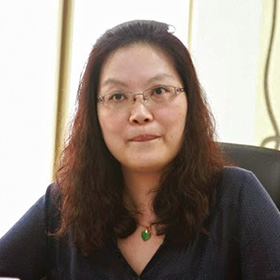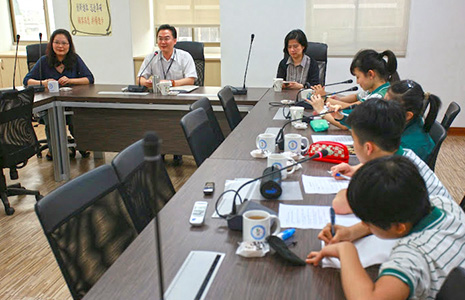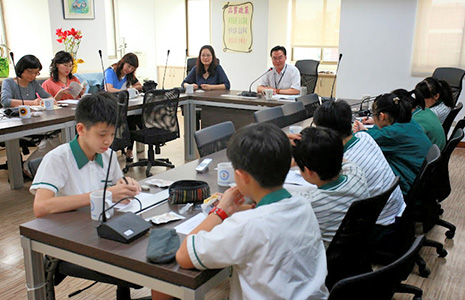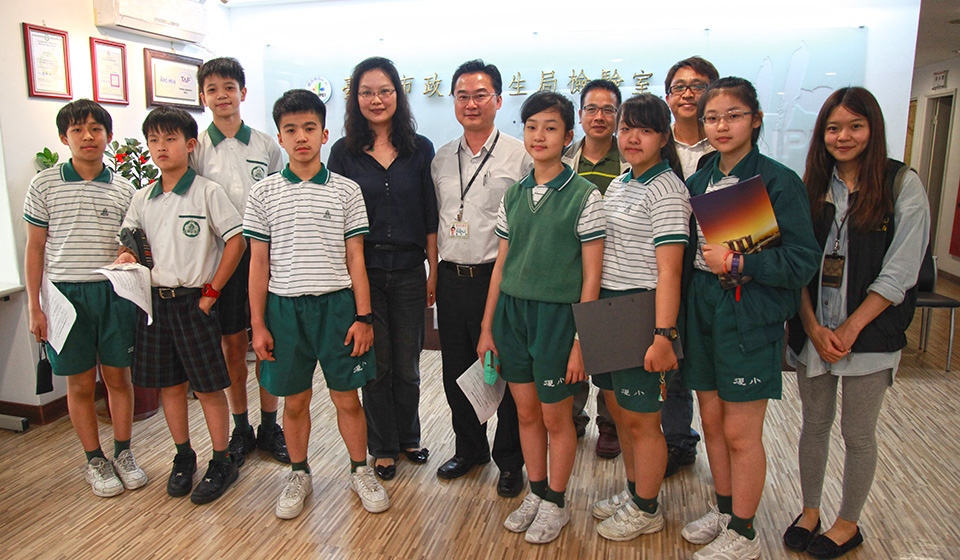| |
| |
|
|
|
|
 |
|
| |
Professor Wan-yu Lo
Education
- Graduate Institute of Food Science and Technology, Cornell University
Experiences
- Researcher, Food and Drug Administration, Ministry of Health and Welfare: mainly responsible for the planning and construction of food industry tracking system
- Researcher, Department of Industrial Technology, Ministry of Economic Affairs: mainly responsible for the strategic planning of domestic biotechnology protein drug industry technology
|
|
| |
|
|
| |
| Food Industry Experts |
(Hui-yu) |
1) Researcher, Department of Industrial Technology,
Ministry of Economic Affairs
Time: April 20, 2014
Location: Graduate Institute of Food Science and Technology, National Taiwan University (NTU)
Introduction
Because our project theme was about food safety, we were very lucky to interview Professor Wan-yu Luo, who has rich background and experience in the research on food health. We hoped she could answer our questions about food safety.
Q1. Your department has published the “Yearbook of Food Consumption Survey in Taiwan”, what are your suggestions on the food consumption habit of people in Taiwan? (Tsai-chen)
A1. The Yearbook of Food Consumption Survey in Taiwan is provided for food producers, allowing them to know the categories of products in the market and the new products each year. Meanwhile, the food producers can also see the demand of the consumption market, so as to develop new products for the consumers.
Q2. We have heard about cloned sheep, cloned cattle and cloned meat, but why isn’t there cloned plants, vegetables or fruits, is it because of the science and technology or the economic factors? (Jie-sheng)
A2. The cloned sheep was the Sheep Dolly cloned in Britain in 1996, when everyone felt the genetically modified food might be the future trend. At that time, there was not enough empirical evidence in food safety. Actually, there is no so-called cloned plant, vegetable or fruit, but there is technology of genetic modification. Perhaps we do not know whether we have eaten the genetically modified food. Take corn for an example, in America, the gene-modified corn accounts for about 90%, like Green Giant corn. Although it claimed that it is not genetically modified, actually it is. The reason for genetic modification at the very beginning was due to insects, the corn was genetically modified to resist insect, pesticide and weed. As for the cloned vegetables, fruits and plants, Bill Gates has a plan recently to make the plants like genetically modified, but we are still not clear what the technology is.
Q3. Many foods in the market are marked as “non-genetic modification”, what is “genetic modification”? Is it related with food science? (Hui-yu)
A3. Genetic modification means to add the genes of other plants or animal to the crops so as to achieve the effect of pest resistance. Although it is well intentioned, it is harmful to the human body and the food chain in the nature.
| |
|
|
 |
|
 |
| |
|
|
Q4. Biomedicine is an emerging industry, is it related with the food safety field? Will biomedicine replace the fresh food in the future? (Tsung-chun)
A4. Biomedicine and bio-food are two different fields, and it cannot replace the fresh products. Biotechnology includes genetic modification; biomedicine includes medicine research and development. Biotechnology can improve the food safety and resistance to spoilage for better quality and product value. For example, there are companies researching the making of fermented bean curd, and using amaranth juice for fermentation. The amaranth contains a lot of natural lactic acid bacteria which are used to pickle amaranth and ferment amaranth juice. Under the condition of more infectious microbe, if the temperature and time are not controlled well, it is easy to generate mold. Thus, purified bacteria are isolated in the laboratory to be used for bean curd fermentation. This is a very good example of application of biotechnology in the traditional food.
Q5. There are many health foods in the market marked as natural and GMP certified, but the media suggest that over consumption of medicines would cause burden to our liver and kidney. How come health food would cause burden to our body? (Wei-tse)
A5. Over the counter medicines do not equal to food, these medicines contain chemicals which will harm human body, so they should be consumed only occasionally. Health foods do not contain chemicals, but substances that are helpful to human body, so they can be consumed daily. However, excess consumption should be avoided. Only proper consumption is beneficial to human body.
Q6. We visited some farms and food critics, and they all think small farms or small and medium enterprises in the agricultural field are neglected by the government in Taiwan. Does technological improvement by your department contribute to the small and medium enterprise and agriculture in Taiwan? If any, what are the opportunities? Or do you have any relevant planning in the future? (Shu-han)
A6. There are many programs offered by the Ministry of Economic Affairs to assist small and medium enterprises on industrial upgrading. One example is the civet coffee in Taitung, which is a case undertaken by the Industrial Technology Research Institute (ITRI). Based on the principle of civet coffee, we extract ferment from the intestines and stomach of civet to upgrade the product value. At present, the civet coffee in Taitung is very popular, and this is a good example of how we assist the industrial upgrading.
Q7. What is the main contribution of food science to the human beings? Is there any disadvantage? (Jie-sheng)
A7. The advantage is that food science makes our food diversified and more different choices; the disadvantage is that to attract consumers with taste and look, additives are added to the food. Only a few additives are safe, but they still cause burden to the human body. Indeed, there are both advantage and disadvantage. Actually, we love and hate food science, because without food processing technology, we do not have such variety of food; on the other hand, it is exploited by businessmen for profits.
Q8. There have been many food safety problems, is there any method to eradicate the problem? (Yin-cheng)
A8. The Department of Health inspects the food every year. Some manufacturers do not make improvements even though their foods fail to pass the inspection. This leads to a vicious cycle, because some manufacturers think that making profit is the most important and do not consider people’s health. So, food management is better to start from the source. If there is no adulterated food at the upper stream, the food processors do not need to inspect the food. Food is not like drug which can be used only after registration. The central government should take measures on the source management. To eradicate the problems, two conditions must be satisfied, one is that there should be a complete food industry control and management mechanism, and the second is to strengthen education.
Q9. You are a doctor in food science, what are the requirements on your food? (Tsai-chen)
A9. I think the main concept is that all foods should be edible, and all diets should be balanced and appropriate. Any food has its risks, so the balanced and appropriate diet can spread risks, and this is the best method.
Conclusion
We are much honored to interview Dr. Wan-yu Lo, who focuses on the research of developing high-quality food. The topic in this interview is related to natural and toxic-free plantation, as well as the influence of genetic modification and food on human body. Food safety is very important. The problems of preservative, plasticizer and chemical substances in foods have caused panic in society. Pursuing a healthy and nontoxic life is the responsibility to be maintained and pursued by everyone. |









